List of windmills in New York
This is a list of windmills in the American state of New York.
| Location | Name of mill and coordinates |
Type | Built | Notes | Photograph |
|---|---|---|---|---|---|
| Amagansett | Amagansett Mill | Smock | 1815 | Moved within Amagansett 1829. | |
| Amagansett | Amagansett Mill | Smock | 1829 | Burnt down 1924. | |
| Amagansett | Quail Hill Farms Cottage Mill 40°59′10.1″N 72°08′13.1″W |
Smock | 1810 | Cottage with mill workings removed - New England style smock windmill built into Marilyn Monroe’s/Arthur Miller's Amagansett cottage hideaway, Built in the 1820's, it was converted into a cottage in 1950 by Samuel Rubin, Fabergé perfume mogul. Other famous tenants include Ralph Lauren, Terence Stamp and Kurt Vonnegut. Also known as Deep Lane cottage.[1] | 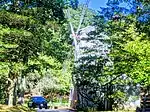 |
| Amagansett | Amagansett Mill Reform Inn Replica[2] 40°58′27.9″N 72°08′40.4″W |
Smock | 1925 | 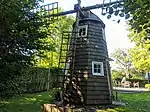 | |
| West Babylon, Long Island, NY. | West Babylon Windmill replica 40°42′15.5″N 73°20′40.3″W |
Smock | 1984 | Village green replica. West Babylon was originally a horticultural farm for tulips, the windmill at Route 109 and Little East Neck rd is a contributing property on the NRHP for the Little East Neck Historic District. | 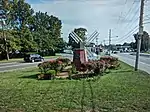 |
| West Babylon, Long Island, NY. | Bulk's Garden Center Windmill | Smock | 1929 | Demolished in 1983. | 1930's picture of Bulk's Windmill 1955 picture |
| Bay Shore | Conover Mill | Smock | 1880 | ||
| Bridgehampton | Beebe Mill | Smock | 1830s | Moved within Bridgehampton 1889 | |
| Bridgehampton | Beebe Mill | Smock | 1889 | Moved within Bridgehampton 1915 | |
| Bridgehampton | Beebe Mill 40°56′03″N 72°18′05″W |
Smock | 1915 | HAER NY-67 | 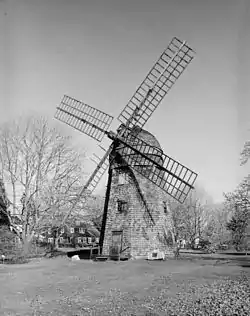 |
| Sag Harbor | Sag Harbor Convention Center Windmill replica 41°00′10.1″N 72°17′45.7″W |
Smock | 1966 | The Sag Harbor Convention and Visiters Center is a replica of the Beebe Mill, on Long Wharf at 1 Ferry Rd. The spot is 50' east the site of the original mill on Long Wharf.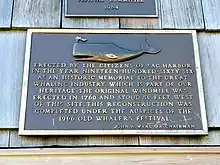 Plaque marking the installation of the Replica mill 20180916 151045 |
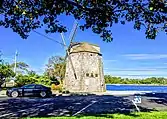 |
| East Hampton | Edwin DeRose Windmill Cottage 40°57′49.2″N 72°11′32.1″W |
Smock | 1926 | Replica of a smock mill built into a large cottage. [3] |  |
| East Hampton | Gardiners Island Mill | Smock | 1771 | Moved within East Hampton 23 May 1795. | |
| East Hampton | Gardiners Island Mill 41°05′28″N 72°06′40″W |
Smock | 1795 | (HAER) No. NY-125- When finished in 1795, the mill was painted white to serve as a navigational landmark for the nearby wharf. It was refurbished in 1816 by N.Dominy V and crew. Further repairs were done by V in 1828 and 1833. The windmill was last used and repaired in 1889[4] |  |
| East Hampton | Gardiners Mill 40°57′18.0″N 72°11′31.6″W |
Smock | 1804 |  | |
| Haye Ground | Hayground Mill | 1801 | 171 Hayground Road, Bridgehampton, NY 11932. Moved within East Hampton to Pantigo beach estate 1950. | 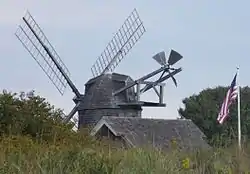 | |
| East Hampton | Hayground Mill 40°57′18.6″N 72°09′55.8″W |
1950 | Moved to the dunes Windmill Ln |  | |
| East Hampton | Hook Mill 40°57′56″N 72°11′02″W |
Smock | 1806 | 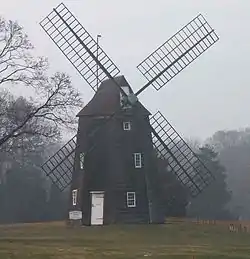 | |
| East Hampton | Wainscott Mill 40°56′01″N 72°14′16″W |
Smock | 1940 | HAER NY-144 | 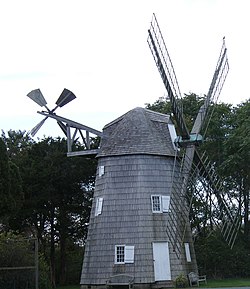 |
| East Hampton | Hunting Miller's Mill -(Pantigo) Mill hill site of prev 1771 mill | Smock | Built 1804 | Moved within East Hampton, 1850,1917. Originally Southampton Mill Hill II. | |
| East Hampton | Schellinger Mill-'Pantigo' moved to Pantigo and Egypt Ln | Smock | 1850 | Moved within East Hampton 1850,1917. | |
| East Hampton | Mulford Farm Mill (Pantigo) moved fm Pantigo rd to Mulford | Smock | 1917 | Mulford Homestead museum 1771 weathervane | 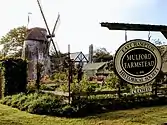 |
| East Hampton | Pantigo Mill 40°57′24.0″N 72°11′26.7″W |
Smock | 1804 | Pantigo Windmill - 1771 weathervane | _6913.jpg.webp) |
| Glen Island | Orient Mill | Smock | 1910 | ||
| Hampton Bays | Good Ground Mill | Smock | 1860 | Moved to Southampton 1890. | |
| Hempstead | Hofstra Mill | Smock | 1903 | ||
| Hewlett | Hewlett Mill | Smock | 1791 | ||
| Huntington | Sammis Mill | Vertical axle mill | 1825 | ||
| Freeport | Norman Levy Park windmill 40°38′52.3″N 73°33′47.6″W |
Spider legged Windmill | 2000 | The windmill is atop a former landfill, it is used by 2 man-made ponds to provide circulation of fresh-water for a wildlife habitat. | |
| Montauk | Arthur W. B. Wood House & Mill Replica 41°03′17.8″N 71°56′31.1″W |
Smock | 1928 | The windmill is a replica built by Architect A.W.B. Wood along with the house. The house structure incorporates a three-story windmill which is decorative only. It is the only windmill house in Montauk.[5] |  |
| Morris Island | (two mills)[6] | ||||
| Morristown | McConnell's Mill Stone Mill 44°35′22″N 75°38′42″W |
Stone | 1825 | It is the only windmill on the American side of the St. Lawrence Valley. NRHP | |
| Napoli | Gladden Mill 42°14′07″N 78°53′44″W |
1890 | a vertical wind turbine built during the 19th century.NRHP listed in 1973, the windmill has been dismantled and moved to Conewango, New York. | ||
| Oakdale | Bourne Windmill.[7] | Tower | 1911 | An American farm design tower windmill, demolished 2004-2005 |  |
| Orient | Orient Mill | Smock | 1810 | Moved to Glen Island 1910. | |
| Sagamore Hill | Sagamore Hill windpump windmill 40°53′08.2″N 73°30′01.2″W |
Spider legged Windmill | 1905 | The windmill is a replica of 2 prior windmills Theodore Roosevelt had installed. The 1st was built when the house was constructed in 1881. A 2nd windmill, and a supplemental gasoline powered pump, replaced it in 1905. The mills were utilized to pump fresh water from the well, and the water was sent to a storage tank and to a hot water heater in the house. Despite being in a rural location, Sagamore Hill had the same facilities as most city houses, including a porcelain tub next to the main hall. Contritubing property NRHP | 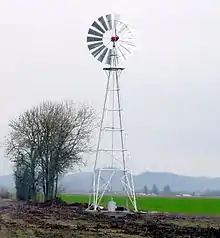 |
| Eastport | Remsenburg Academy windmill 40°48′31.6″N 72°42′21.4″W |
Spider legged Windmill | 1925 | The Spider legged Windmill is on an adjacent property, legs are covered. |  |
| Eastport | Remsenburg lodge windmill 40°48′31.4″N 72°43′19.2″W |
Smock | 1825 | The windmill was converted into a laundry room for the salt water pool next to it. |  |
| Sag Harbor | Beebe Mill | Smock | 1820 | Moved to Bridgehampton 1830s, originally on Suffolk street in Sag Harbor, it was the high point to signal when whaling ships were spotted, a flag was then displayed and the residents began converging on the wharf, it was moved 4 more times towards Bridgehampton, ending up on Ocean Lane. Considered the Queen of the Hamptons, Beebe sits on two acres in Bridgehampton. | 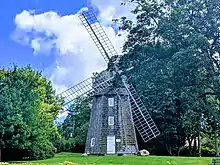 |
| Sag Harbor | Corwith Mill - Built at Hog Neck 1799 | Smock | 1800 | Moved to Water Mill 1814. | 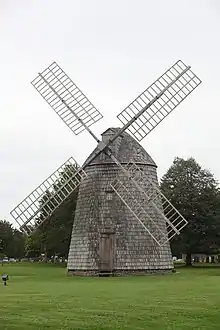 |
| Water Mill | Corwith Mill | Smock | 1814 | Moved to Water Mill 1814 | 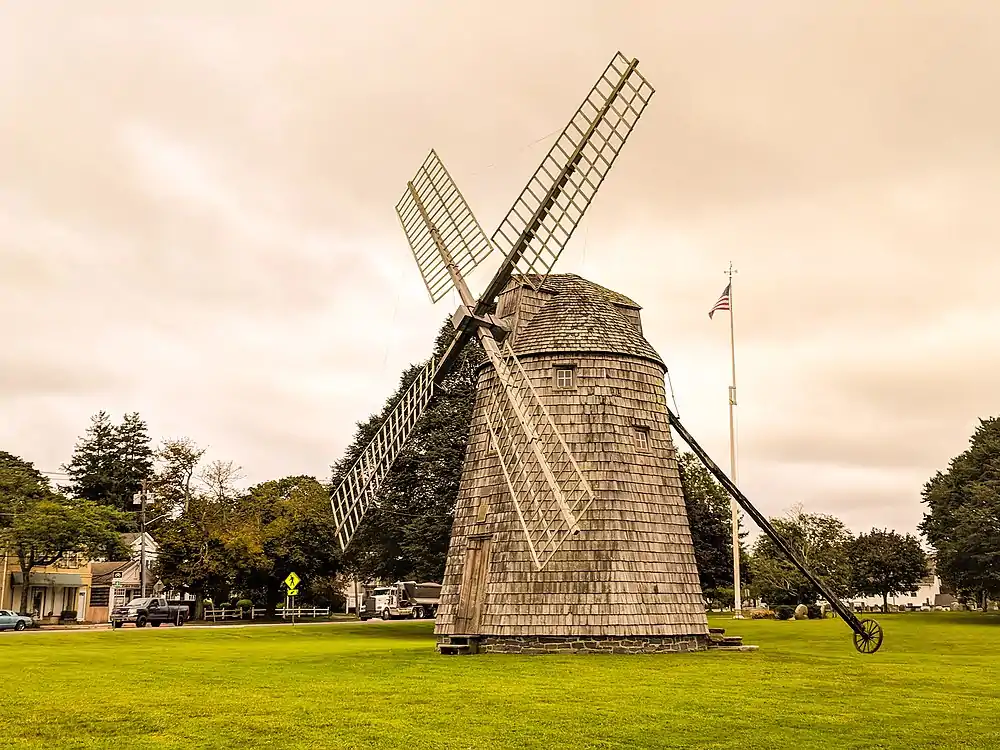 |
| Water Mill | Water Mill Windmill 40°54′34″N 72°21′15″W |
1800 | Moved to Water Mill 1814 triangle at Villa Maria | 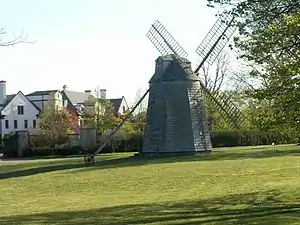 | |
| Shelter Island | Shelter Island Mill 41°04′33″N 72°20′08″W |
1810 | windmill built 1810 at Southold by Nathaniel Dominy jr. He used parts from a previous mill. Moved to Shelter Island by barge. | ||
| Shelter Island | Good Ground Mill | Smock | 1807 | Moved to Hampton Bays 1860 | |
| Shelter Island | Sylvester's Mill | Smock | 1839 | (HAER) No. NY-145[8] Moved in 1926 by Miss Cornelia Horsford to the grounds of Sylvester Manor. | |
| Southampton | Burnt down prior to 1813 | ||||
| Southampton | Smock | 1813 | Mill Hill II, Moved to Wainscott 1840. | ||
| Southampton | Good Ground Mill | Smock | 1890 | ||
| Southampton | Windmill Lane Mill I | Smock | 1712 | Moved to Mill Hill, Southampton 1890. |  |
| Southampton | Mill Hill Mill I, Southampton College | Smock | 1890 | Arthur Brigham Claflin, a textile magnate, bought the mill and moved it to his estate, where it became a playroom for his daughter. She died after a fall in the mill and it's claimed she haunts it still. | 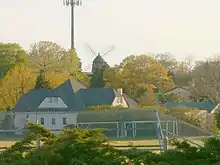 |
| Southampton | Shinnecock Hills Mill 40°53′17.2″N 72°26′44.0″W |
Smock | 1916 | Mill Hill Mill I was part of the Claflin Estate, after WWII the estate was sold and the windmill cottage became the Tucker Mill Inn. | 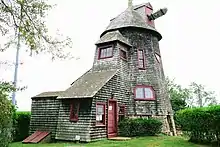 |
| Southampton | National Links Mill 40°54′43.0″N 72°27′03.5″W |
Smock | 1916 | Mill moved from Europe to National Golf Links between the 2nd & 16th holes. Installed by C.B. McDonald and billed to Daniel E. Pomeroy for complaining about an errant ball in a water barrel, and for suggesting a better use of the spot would be a windmill.[9] | 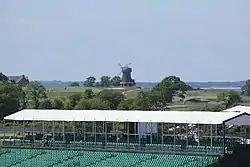 |
| Southold | Mill Hill | Smock | 1810 | Moved to Shelter Island 1839. | |
| St. James | Butler Windmill | Tower | 1894[10] | 150 foot high tower, the Andrew J.Corcoran designed spider legged windpump was built to be the strongest and highest in the world, the water was pumped to a reservoir a mile away to Prescott Hall Butler's estate. A.J.Corcoran Co. built windmills (See Bourne Windmill) and Butler was a NY Attourney. The Butler windpump brand added improvements to the technology of windpumps in 1897, 1898 and 1905[11] | |
| Wainscott | Wainscott Mill | Smock | 1840 | Built 1813 on Mill hill to replace mill burnt the prior year, (became Mill Hill II), 1841 purchased and moved next to Mill Hill I by owner Barney Green, who owned I & II, 1858 moved to Wainscott by Cornelius Conklin where it remained for 50 yrs, changed owners 2x, 1912 became the Wainscott Public Library. Lathrop Brown purchased the mill in 1922 and moved it to Montauk just west of the Lighthouse where it merged into a cottage, the US Gov't took it in 1942 and Brown gave it to the Georgica Beach Assoc., They moved it to Georgica Pond in the 1940's[12] |  |
Notes
Known building dates are in bold text. Non-bold text denotes first known date. Iron windpumps are on this list and noted if listed on the National Register of Historic Places.
Sources
^1 Leeds, Gerald A, and Pulling, Anne Francis (1999). Windmills and Water Mills of Long Island. Charleston, SC: Arcadia. ISBN 0-7385-0288-X.
References
- https://nypost.com/2018/05/05/you-can-rent-marilyn-monroes-hampton-summer-cottage/
- https://www.google.com/books/edition/Windmills_and_Water_Mills_of_Long_Island pg.23
- https://nypost.com/2016/05/19/wanna-live-in-a-windmill/
- https://tile.loc.gov/storage-services/master/pnp/habshaer/ny/ny1100/ny1136/data/ny1136data.pdf
- https://nypost.com/2018/05/16/architect-built-1-9m-dream-home-inside-windmill/
- Mock Mill, never a working windmill
- Some Recent Farm Buildings, Estate of Commodore Frederick Bourne, Architectural Forum, volume 30, no. 3, page 74-76
- https://tile.loc.gov/storage-services/master/pnp/habshaer/ny/ny1200/ny1275/data/ny1275data.pdf
- https://geekedongolf.com/2016/02/national-golf-links-of-america-tour-by-jon-cavalier/
- A Very High Windmill, Scientific American, weekly, April 7, 1894; vol. LXX, no.14, page 217
- http://www.vintagewindmillpartslist.com/sitebuildercontent/sitebuilderfiles/butlerpictorial.pdf
- https://tile.loc.gov/storage-services/master/pnp/habshaer/ny/ny1200/ny1274/data/ny1274data.pdf
This article is issued from Wikipedia. The text is licensed under Creative Commons - Attribution - Sharealike. Additional terms may apply for the media files.
